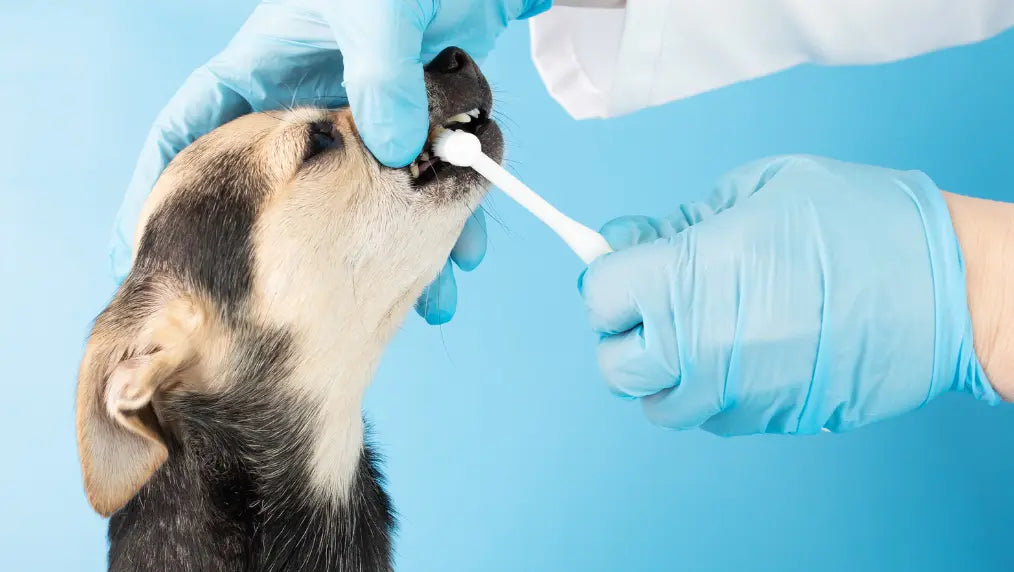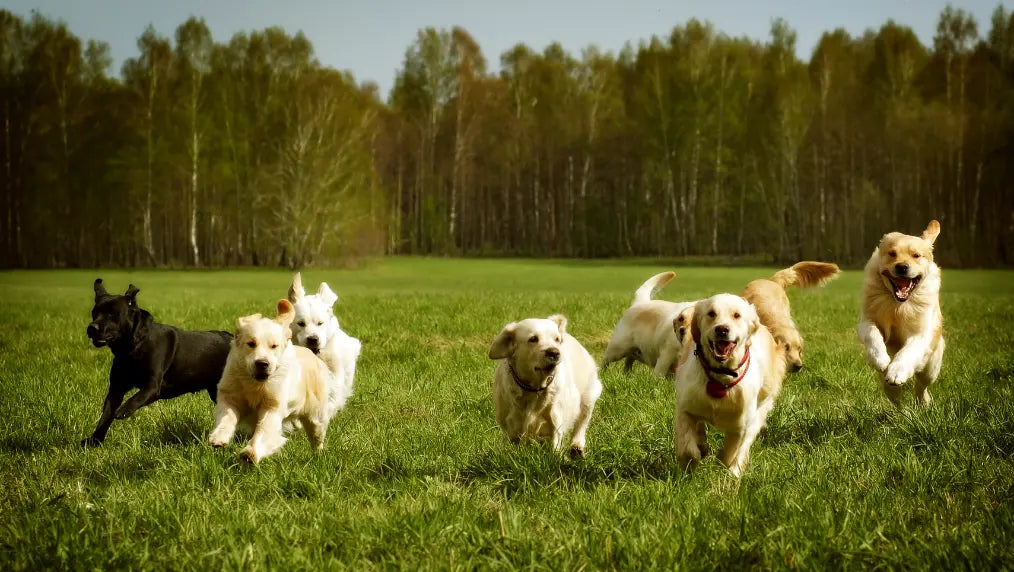The Bichon Frise, with it's charming personality and fluffy appearance, is a beloved canine companion known for it's affectionate nature. One common behavior exhibited by these delightful dogs is their propensity for licking. Bichon Frise owners: you know what I'm talking about. While licking is a natural behavior in most dogs, The Bichon Frise often seems to do it more frequently and for various reasons. So why do bichons lick so much?
About The Bichon Frise

The Bichon Frise is a small, charming dog breed known for its cheerful disposition, affectionate nature, and distinctive white curly coat. Plenty of other dogs lick their humans and their toys, but the Bichon Frise is known to be a particularly “licky” breed. Many owners of this adorable toy dog breed have noticed that their pets will regularly lick them, themselves, and random items throughout the house. But what about them makes them more prone to licking?
Some Key Characteristics and Traits of the Bichon Frise
Appearance
-
Size: The Bichon Frise is a small dog, typically weighing between 10 to 20 pounds (4.5 to 9 kilograms) and standing about 9 to 12 inches (23 to 30 centimeters) tall at the shoulder.
-
Coat: They have a dense, curly, and hypoallergenic coat that doesn’t shed much. Their white coat is their trademark, although some may have shades of cream or apricot.
-
Facial Features: Their dark round eyes, black nose, and a gentle expression contribute to their endearing appearance. They have a distinctive powder-puff appearance due to their plush, curly coat.
Temperament
-
Affectionate: The Bichon Frise is known for their affectionate and loving nature. They are often friendly and enjoy spending time with their families.
-
Playful: These dogs have a playful and lively personality. They often maintain their playful demeanor well into adulthood.
-
Sociable: The Bichon Frise generally gets along well with people, children, and other pets. They have a social nature and thrive on companionship.
Behavior and Care
-
Intelligent: The Bichon Frise is an intelligent dog, making them relatively easy to train. They respond well to positive reinforcement-based training methods.
-
Moderate Exercise Needs: Despite their small size, Bichon Frises have moderate exercise needs. Regular walks and playtime suffice to keep them happy and healthy.
-
Grooming: The coat of the Bichon Frise requires regular grooms to prevent matting and to maintain its appearance. Professional grooming every few weeks is common to keep their coat in top condition.
History
-
Origin: The Bichon Frise's origins can be traced back to the Mediterranean region, where they were favored as companion dogs by European nobility.
-
Companion Dogs: They were particularly popular in France, where they became known for their cheerful demeanor and skills as companion animals.
Health
-
Generally Healthy: The Bichon Frise is relatively known to be a healthy dog, but like all breeds, they can be prone to certain health issues such as dental problems, allergies, and joint conditions.
-
Lifespan: On average, Bichon Frises live around 12 to 15 years, though some can live longer with proper care.
Why Does The Bichon Frise Lick So Much?

You may notice that the Bichon Frise licks. A LOT. In fact, this breed LOVES to lick. Whether it’s their own paws or your face, it’s almost as if they cannot help but use their tongues constantly. But why? Let’s dive in.
The Instinctual Drive
1. Communication and Social Interaction
Dogs, including the Bichon Frise, use licking as a means of communication. Licking can be a form of social interaction, showing affection, and establishing bonds. It's their way of expressing love and affection towards their owners and other animals in their pack.
2. Stress Relief and Soothing
Licking can be a self-soothing behavior for dogs. When they feel anxious or stressed, licking releases endorphins that can have a calming effect. The Bichon Frise, being a sensitive dog, might resort to licking as a way to comfort themselves when they're feeling anxious or unsure. It can also be the result of separation anxiety, which pet owners need to look out for and address as early on as possible.
Health Problems and Symptoms
1. Grooming and Cleaning
Bichon Frises are known to be relatively clean dogs. Licking is a part of their grooming routine. They might lick themselves to keep their coat clean or to remove dirt or debris from their fur.
2. Skin Irritation or Allergies
Excessive licking in Bichon Frises might sometimes indicate skin irritation, allergies, or discomfort. For example: hot spots. If you notice your Bichon Frise excessively licking a particular area, it could be a sign of an underlying skin issue, and a veterinarian visit might be necessary to rule out any medical conditions.
3. Issues With Their Anal Sacs
While healthy anal glands naturally fill with fluid and expel with defecation, bacterial infection can set in and clog these sacs. This can feel uncomfortable and painful, so the Bichon Frise can often lick at the area to relieve their discomfort.
Attention and Habit
1. Seeking Attention
The Bichon Frise, being an affectionate and social dog breed, might start licking to gain attention from their owners or to elicit a response. If they receive positive reinforcement (such as attention or petting) after licking, they might continue this behavior to seek more attention, leading to obsessively licking.
2. Learned Behavior
Sometimes, licking becomes a learned behavior. If a Bichon Frise puppy is not gently discouraged by their dog owners from excessive licking behaviors during early training, it might become a habit that persists into adulthood.
Managing and Addressing Excessive Licking
-
Training and Distraction: Redirect your Bichon Frise's attention when they start licking excessively. Engage them in alternative activities, such as playing with toys or going for a walk, to distract them from the licking behavior.
-
Regular Grooming and Health Checks: Ensure your Bichon Frise receives regular grooming sessions to maintain their coat and skin health. Additionally, keep an eye on any changes in their skin or coat and consult a veterinarian if you notice excessive licking in specific areas.
-
Consistent Training: Employ positive reinforcement training methods to discourage excessive licking. Reward them for calm behavior or for redirecting their attention away from licking.
Is Licking Your Bichon Frise’s Way of Kissing?
Lots of people, especially on the internet, call a dog’s licks “kisses.” But is licking really your Bichon Frise’s way of kissing you? Well, the answer is maybe. Dogs do lick as a sign of affection; it is something they learn from their mothers when they are groomed and shown affection as puppies. However, dogs may also lick for a range of other reasons.
So while you might just be getting some slobbery puppy kisses, you might also be experiencing your dog trying to let you know about something. Generally speaking though, your Bichon Frise licking you is not a cause for concern. Bichon Frises are known to lick a lot, and usually, the reasons are not concerning. But make sure to pay attention to how much your dog licks you.
Is Dog Face Licking an Actual Health Risk?

Many dogs, Bichons Frises included, will try to lick their owner’s face. Luckily, dog saliva is not inherently dangerous. That is, of course, unless you have an allergy to dog saliva or dander. If you do have an allergy, letting your Bichon Frise lick your face is not wise. For those without allergies, letting your dog lick your face should not cause harm. Dog saliva has bacteria in it, but it also has antibacterial qualities and is unlikely to cause an infection.
It may cause breakouts, and if your dog has been eating particularly fragrant food it may be unpleasant, but it shouldn’t be harmful. Little Bichon Frise licks here and there should not be a problem. For healthy children and adults, dog saliva is not a health risk for intact skin. It is not healthy, however, to allow your dog to lick an open wound on your skin.
Their saliva may continue to keep the wound moist and open and allow bacteria to thrive, leading to a potential skin infection. Typically the dog has to have a high concentration of that particular bacteria, and their saliva has to come into contact with the open wound. It is best practice to wash your hands after petting any dog.
Conclusion
For most healthy people, a dog licking faces or other body parts should pose minimal health risk or health concerns. If you are concerned about the licking, then do not let dogs lick your mouth or anywhere near an open skin wound. While licking is a natural behavior for Bichon Frises, excessive licking might indicate various reasons, ranging from emotional needs to potential health issues.
Understanding the underlying reasons behind their licking behavior and addressing it appropriately through training, attention, and regular health check-ups can help ensure a happy and healthy Bichon Frise.





